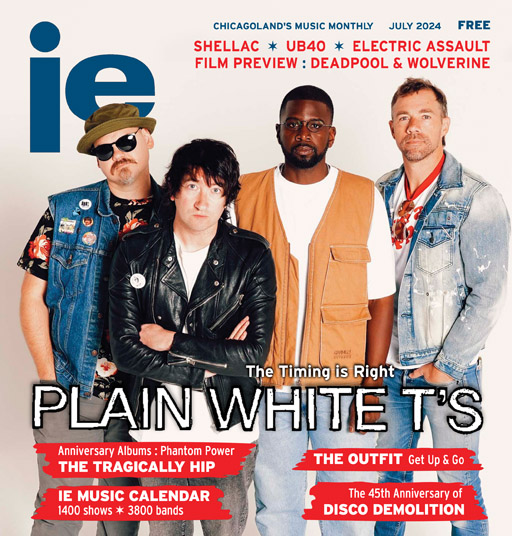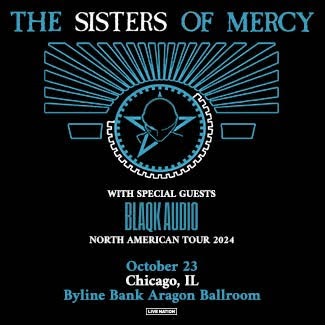Interview: Thomas Dolby

While we’d never met and probably have no friends other than perhaps Facebook’s in common, having “come of age” in lockstep with Thomas Dolby and his music/performances across the ’80s brought a first-ever phone call with him the sense that one was calling a long-lost friend. And, indeed, it was a sense only heightened by Dolby’s own self-imposed near two-decades’ silence from mainstream music. Which is not to say he wasn’t keeping himself busy during that time: embracing technology in Silicon Valley and — not surprisingly given his signature synthesizer/production oeuvre — patenting/profiting from his groundbreaking work in polyphonic ringtones. The immediate question that does arise, however, is what prompted the return to recording — and, ultimately into mainstream music — now?
Appearing: April 5th at Park West (322 W. Armitage) in Chicago.
“I’d been away too long, you know,” Dolby responds frankly, “I never really intended to take 18 years off. One thing led to another — I’d always been involved in technology and going to Silicon Valley was exciting, sort of like going to the source, really, of all technology.
“And it was really happening in the early ’90s, whereas the music business was already, you know, severely in retreat. So I just felt that I could make more of a difference there. And it got very frenetic during the dot-com boom-and-bust years. But the company that I formed ended up being successful in the mobile space. And so I’ve sort of have had an extra two phases, really, to my career: in Silicon Valley and then in mobile and . . .” Dolby pauses, collects his thought and then continues matter of factly, “I’d had enough. I wanted to get back to music, which is my first love and it seemed like a good time to do it.”
But as his chosen route of return — the recently released A Map Of The Floating City — wonderfully displays, his “first love” of music embraces the art and craft of songwriting itself, which also seems sorely missing in an environment where sampling is the most consistently successful creativity. And is something, Dolby somewhat concurs, also served as a prompt to his reignition.
“Well I think it’s not as highly valued as it once was, other than perhaps in the sort of Starbucks café society with sort of singer/songwriters,” he says with a slight chuckle. “But the mainstream music tends to be more groove oriented and there’s so many people out there doing that, that you can’t possibly feel like a pioneer in that space, I don’t think. The value that’s put on the groove and on the production, I just, uh . . . life’s too short, really, to be competing with 10,000 other guys to come up with the coolest groove.
“But what I’ve got that those 10,000 other guys don’t have is that ability to write a song with a story, with a melody, with a vocal, with a structure to it. So I’ve sort of chosen to elevate those values in what I’m doing versus the more superficial production values.”
As a songwriter, Dolby has often cited his admiration for other greats of the craft, in particular citing the chord sequences of Bowie’s earlier classics, among others. Two of the songs on his new album — “Jealous Thing Called Love” and, in particular, “Road To Reno” — sound as if Dolby had taken both vocal and chording cues from the Thin White Duke songbook of that era. Homage or coincidence?
“He was a strong influence on me, as was Prince,” Dolby quickly answers, “again, during the era when each of them used to write songs that needed a guitar tablature to follow them. And they were both very successful and very influential with songs that were, you know, classic songbook songs. Space Oddity to Purple Rain. Or, you know, ‘Ashes To Ashes’ to Sign O’ The Times. And in each case, after the peak of their commercial success they moved to a period — along with the rest of the music industry, I’d have to say — they moved more into the sort of groove space, where, you know, it’s a jam with the vocal on top.” Dolby pauses, then adds somewhat wistfully, “Ahhh, I was just sad about that really. Because they were my heroes at the time when they were writing their best songs.”
While Dolby has divided Map into three sections — “Urbanoia,” “Amerikana,” “Oceanea” — it’s clearly America (with a four-song section) and New York (the subject of two of four “Urbanoia” songs) that predominate as subject matter; and perhaps reflective of Dolby’s 20-year residency on this side of the Atlantic (as opposed to his more recent return to the North Sea side), is the three-song muse for “Oceanea.” Unsurprisingly, Dolby freely admits he’s “strongly influenced by my environment” in his songwriting — but it’s not without unforeseen consequences.
“Well I get into trouble, actually, because when I write these songs, I don’t look my references up. I just sort of have subliminally taken in that the D train goes to Brooklyn,” Dolby breaks into laughter, then continues. “You know I wrote that line without going on Wikipedia to check it out. And it occasionally gets me into trouble, like when I mentioned a ’64 Camaro on ‘Road To Reno.’ Not only did I pronounce it wrong, but also that that particular car didn’t come in ’til ’67. And so people were very quick to point that out to me.”
Pointing out that he did pronounce it like an Englishman causes him to break into laughter again, before offering another misstep from his 1992’s Astronauts & Heretics.
“But I got into the most trouble when I wrote ‘I Love You Goodbye,’ and on live radio in Louisiana it was pointed out to me that, ‘We don’t have ‘county’ sheriffs, we have parishes’; and ‘The Everglades are actually in Florida and not Louisiana.'” Dolby again breaks into laughter, then concludes, “So I obviously need to do my research a bit better.”
Truth be told, Dolby didn’t totally desert music in 1992. Since 2001, he’s served as musical director (and house band leader) of the highly influential TED (Technology, Entertainment, & Design) Conference — an annual gathering of some of the world’s foremost (and most eclectic) thinkers, inventors, speakers, and artists. Says Dolby, “It is great fun. I mean, I really enjoy attending and it’s nice to contribute as well. I get to bring in some pretty interesting musicians — both in my house band, as well as the entertainers we have doing some of the slots and the show. And it’s a great thing, because it really helps people sort of process the barrage of stimulating ideas that you get.”
In fact, as we speak, Dolby is getting ready for this year’s event, after which he’ll embark on a multi-city U.S. tour with a full-fledged band that he’s really looking forward to, and not just for musical reasons. “It’s called the ‘Time Capsule Tour,'” he explains, “because we’re bringing with us a trailer that looks like it was designed by HG Wells and Nikola Tesla. We tie it behind the tour bus, and it houses a personal video-messaging system, which allows you to send a message to the future. The idea is that anyone who comes down to the shows [and other stops] can have some private time in the time capsule and record a private message to the future. You can talk about whatever you want — you can talk to your grandchildren if you like. But you could also talk to space aliens that visit the planet years after our species has been wiped out. So what would you say to them, you know? ‘What went wrong?’
“And these clips will be uploaded to YouTube and rated by viewers. So the most successful clips will go into the time capsule — which is a hard drive that I’m trying to get sent into space.”
So Dolby must be looking to the Russians or Chinese to launch his dream, since the U.S. seems to have ceded the space to them for the time being?
“Well, actually in the private sector, there’s quite few people sending rockets up,” Dolby points out, “and a lot of them are at TED, so hopefully I will find an interested party next week.”
— David C. Eldredge










